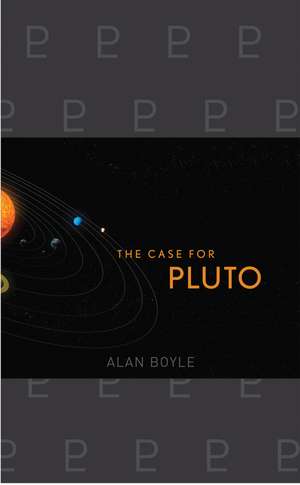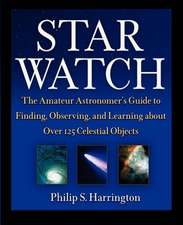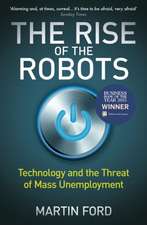The Case for Pluto: How a Little Planet Made a Big Difference
Autor Alan Boyleen Limba Engleză Hardback – 5 noi 2009
In The Case for Pluto, award–winning science writer Alan Boyle traces the tiny planet′s ups and downs, its strange appeal, the reasons behind its demotion, and the reasons why it should be set back in the planetary pantheon.
- Tells the compelling story of Pluto′s discovery and how it became a cultural icon
- Makes the case for Pluto as planet, countering the books that argue against it
- Comes in a small, friendly package just like Pluto and features a handsome design, making it a great gift
Alan Boyle is MSNBC.com s science editor and the award–winning blogger behind Cosmic Log. He s been a talking head on NBC s The Today Show and the MSNBC cable channel, holding forth on scientific subjects ranging from the chances of an asteroid Armageddon to the 3–D wizardry behind the Harry Potter movies. But he writes better than he talks.
Preț: 125.37 lei
Nou
Puncte Express: 188
Preț estimativ în valută:
23.100€ • 26.07$ • 20.17£
23.100€ • 26.07$ • 20.17£
Carte disponibilă
Livrare economică 31 martie-14 aprilie
Preluare comenzi: 021 569.72.76
Specificații
ISBN-13: 9780470505441
ISBN-10: 0470505443
Pagini: 258
Dimensiuni: 135 x 186 x 24 mm
Greutate: 0.36 kg
Editura: Wiley (TP)
Colecția John Wiley &Sons
Locul publicării:Hoboken, United States
ISBN-10: 0470505443
Pagini: 258
Dimensiuni: 135 x 186 x 24 mm
Greutate: 0.36 kg
Editura: Wiley (TP)
Colecția John Wiley &Sons
Locul publicării:Hoboken, United States
Descriere
"All the intrigue and passion of a political scandal." K.C. Cole, author of Something Incredibly Wonderful Happens "An engrossing voyage of discovery about not only Pluto, but about the very process of scientific discovery." Alan Boss, author of The Crowded Universe
"A must–read for any fan of astronomy!" Alan Stern, author of Pluto and Charon
"A must–read for any fan of astronomy!" Alan Stern, author of Pluto and Charon
Textul de pe ultima copertă
"All the intrigue and passion of a political scandal." K.C. Cole, author of Something Incredibly Wonderful Happens "An engrossing voyage of discovery about not only Pluto, but about the very process of scientific discovery." Alan Boss, author of The Crowded Universe
"A must–read for any fan of astronomy!" Alan Stern, author of Pluto and Charon
"A must–read for any fan of astronomy!" Alan Stern, author of Pluto and Charon
Cuprins
Acknowledgments. 1 The Planet in the Cornfield.
2 Fellow Wanderers.
3 The Search for Planet X.
4 Pluto and Its Little Pals.
5 The Meaning of a Moon.
6 There Goes the Neighborhood.
7 Not Yet Explored.
8 Betting on the Tenth Planet.
9 The Battle of Prague.
10 The Lighter Side of Pluto.
1 1 The Great Planet Debate.
12 The Day of the Dwarfs.
13 Planet X Redux.
14 Alien Plutos.
15 The Case for Pluto.
Appendix A. What to Tell Your Kids about Planets.
Appendix B. The International Astronomical Union′s Resolutions and Revisions.
Appendix C. Planetary Vital Statistics.
Notes.
Selected Bibliography.
Credits.
Index.
2 Fellow Wanderers.
3 The Search for Planet X.
4 Pluto and Its Little Pals.
5 The Meaning of a Moon.
6 There Goes the Neighborhood.
7 Not Yet Explored.
8 Betting on the Tenth Planet.
9 The Battle of Prague.
10 The Lighter Side of Pluto.
1 1 The Great Planet Debate.
12 The Day of the Dwarfs.
13 Planet X Redux.
14 Alien Plutos.
15 The Case for Pluto.
Appendix A. What to Tell Your Kids about Planets.
Appendix B. The International Astronomical Union′s Resolutions and Revisions.
Appendix C. Planetary Vital Statistics.
Notes.
Selected Bibliography.
Credits.
Index.
Recenzii
With a fresh style and a clear voice, Alan Boyle addresses The Case for Pluto. Ever since the search for a planet between Mars and Jupiter led to the discovery of the asteroid belt, the hunt for a planet at the edge of the solar system not only led to the discovery of Clyde Tombaugh′s Pluto, but also to the now well–known Kuiper Belt and the lesser known Ort Cloud. Several efforts have aimed to demote Pluto to dwarf planet status, leading to one of the biggest controversies astronomy has seen since astronomers tried to capture images of stars hiding behind the sun during a solar eclipse as predicted by Einstein. A number of planet demystifiers have come to the aid of the planet degradation era, some with torches held high and some with lynch knots. The main problem is that Pluto has enjoyed popularity. Boyle puts up a good battlefront in the case for Pluto, considering every angle and leaving no scientific mind undisturbed. What the scientific community could agree upon was that Pluto was both a planet and not a planet at the same time. The solution was to reclassify, hoping to quell the problem. A must read.
Reviewed by D. Wayne Dworsky (Sacramento / San Francisco Book Review) Boyle, the science writer for msnbc.com, has written a charming and informative book that requires no science background. The International Astronomical Union′s decision to downgrade Pluto′s status from a planet is the book′s jumping–off point, from which Boyle backtracks to relate the history of Pluto′s discovery and naming, the discovery of its moon, its scientific features, and all the developments of its scientific study, including developments in the technology of telescopes and space missions. The personal element of the story adds spice to the narrative, with astronomers arguing over Pluto′s identity and the public weighing in with their own personal attachment to Pluto as a planet. The book concludes with an appendix on what to tell your kids about planets. (Sci–Tech Book News)
When the International Astronomical Union voted in 2006 to evict Pluto from the roster of planets in our solar system, little did they expect the public outcry that would arise. Boyle, an award–winning science writer and the science editor at MSNBC.com, presents the issues regarding Pluto′s status, both popular and scientific, in a winning fashion. After its discovery in 1930, the icy rock formerly known as Planet X was embraced by the public imagination, partly due to its status as "the oddball of the solar system"; no doubt having Walt Disney name a cartoon dog after it also helped. But as astronomers learned more about the solar system and the distant Kuiper Belt at its fringes, they realized that Pluto, with its lopsided spin and strangely tilted orbit was very special indeed. Now astronomers have identified at least five dwarf planets, or "mini–worlds," orbiting our Sun. When the New Horizons spacecraft reaches Pluto in 2015, we′ll know more about this "underdog of the solar system." Even then, the furor is bound to continue. Photos. (Nov.) (Publishers Weekly, September 14, 2009)
Reviewed by D. Wayne Dworsky (Sacramento / San Francisco Book Review) Boyle, the science writer for msnbc.com, has written a charming and informative book that requires no science background. The International Astronomical Union′s decision to downgrade Pluto′s status from a planet is the book′s jumping–off point, from which Boyle backtracks to relate the history of Pluto′s discovery and naming, the discovery of its moon, its scientific features, and all the developments of its scientific study, including developments in the technology of telescopes and space missions. The personal element of the story adds spice to the narrative, with astronomers arguing over Pluto′s identity and the public weighing in with their own personal attachment to Pluto as a planet. The book concludes with an appendix on what to tell your kids about planets. (Sci–Tech Book News)
When the International Astronomical Union voted in 2006 to evict Pluto from the roster of planets in our solar system, little did they expect the public outcry that would arise. Boyle, an award–winning science writer and the science editor at MSNBC.com, presents the issues regarding Pluto′s status, both popular and scientific, in a winning fashion. After its discovery in 1930, the icy rock formerly known as Planet X was embraced by the public imagination, partly due to its status as "the oddball of the solar system"; no doubt having Walt Disney name a cartoon dog after it also helped. But as astronomers learned more about the solar system and the distant Kuiper Belt at its fringes, they realized that Pluto, with its lopsided spin and strangely tilted orbit was very special indeed. Now astronomers have identified at least five dwarf planets, or "mini–worlds," orbiting our Sun. When the New Horizons spacecraft reaches Pluto in 2015, we′ll know more about this "underdog of the solar system." Even then, the furor is bound to continue. Photos. (Nov.) (Publishers Weekly, September 14, 2009)
Notă biografică
Alan Boyle is the science editor for MSNBC.com and also appears on MSNBC news. He has won multiple awards for his science writing from the the American Association for the Advancement of Science, the National Association of Science Writers, and the Space Frontier Foundation.

















